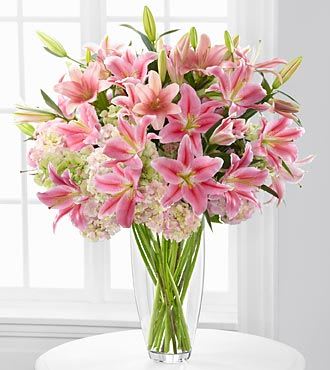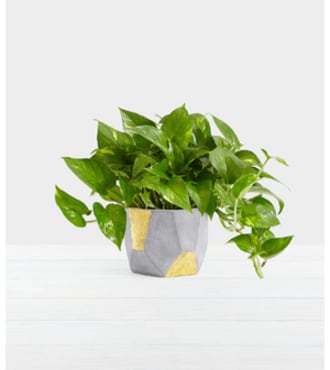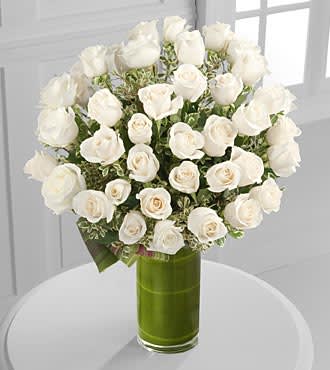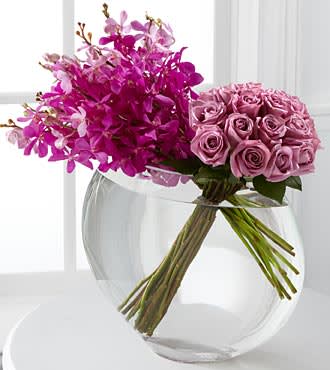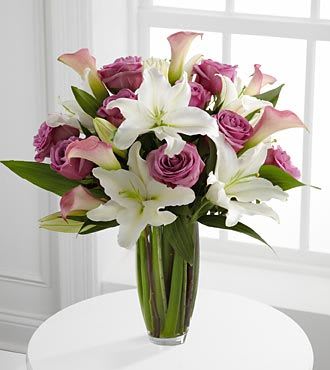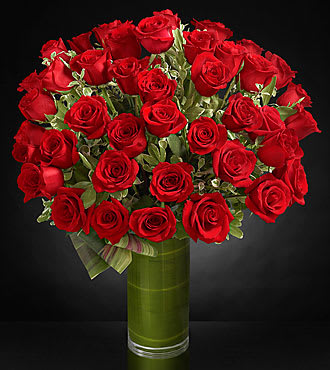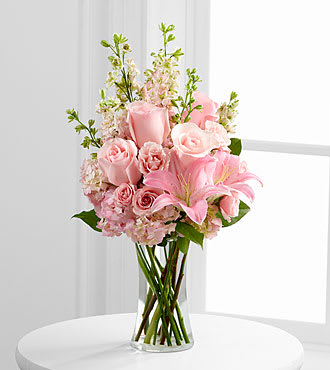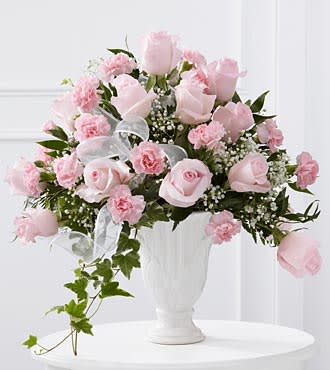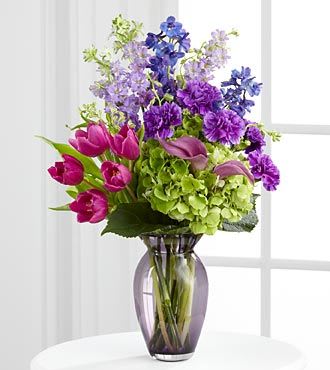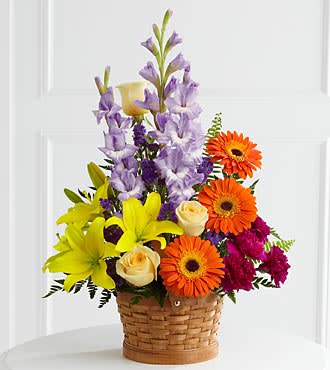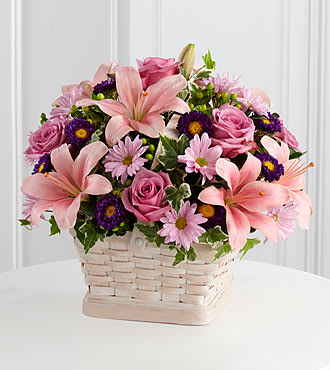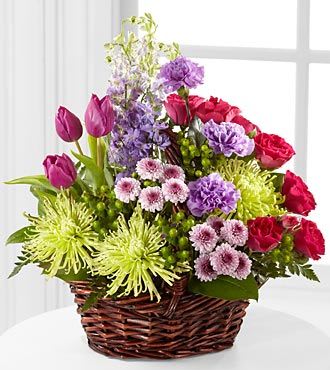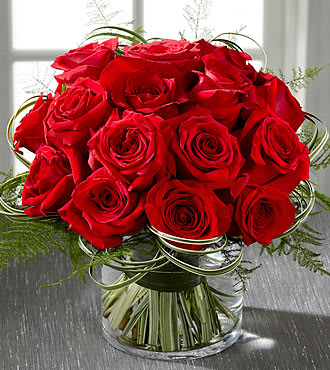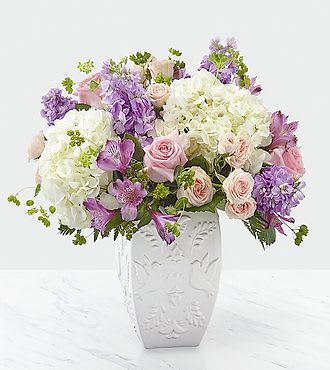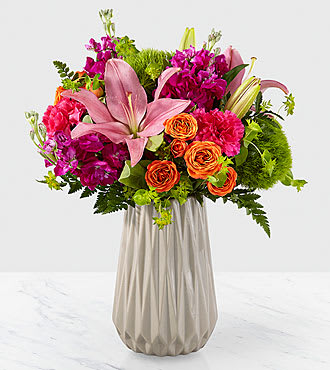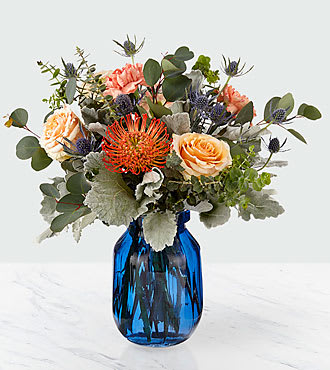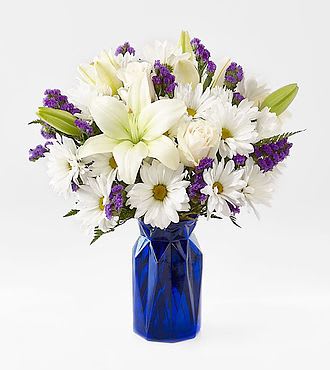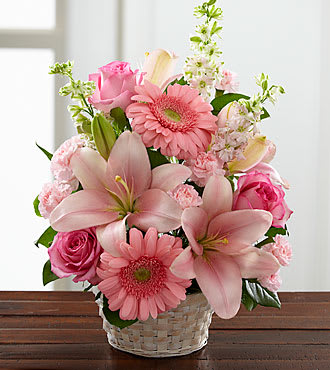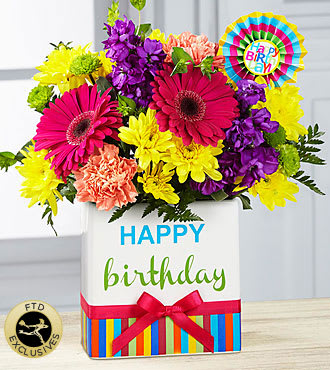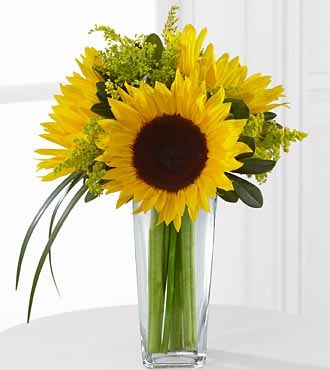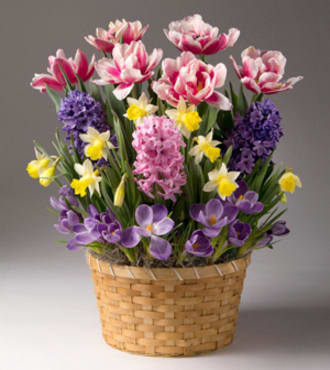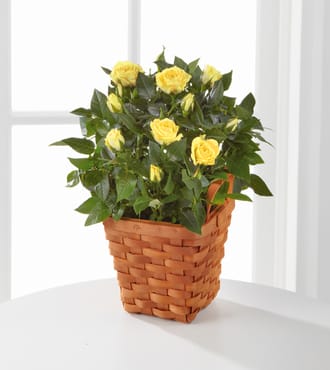- Best Value
- Best Sellers
- Under $60
- $89.90
- $89.90
- $87.90
- $97.90
June 1, 2025
Gratton June Floral Selection
The Bloom Central flower delivery of the month for June in Gratton is the Blooming Masterpiece Rose Bouquet
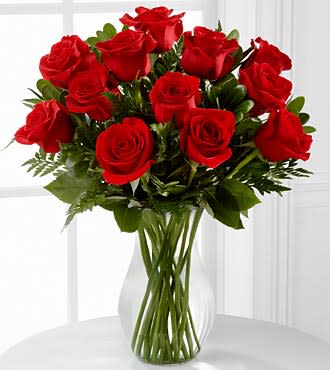
The Blooming Masterpiece Rose Bouquet from Bloom Central is the perfect floral arrangement to brighten up any space in your home. With its vibrant colors and stunning presentation, it will surely catch the eyes of all who see it.
This bouquet features our finest red roses. Each rose is carefully hand-picked by skilled florists to ensure only the freshest blooms make their way into this masterpiece. The petals are velvety smooth to the touch and exude a delightful fragrance that fills the room with warmth and happiness.
What sets this bouquet apart is its exquisite arrangement. The roses are artfully grouped together in a tasteful glass vase, allowing each bloom to stand out on its own while also complementing one another. It's like seeing an artist's canvas come to life!
Whether you place it as a centerpiece on your dining table or use it as an accent piece in your living room, this arrangement instantly adds sophistication and style to any setting. Its timeless beauty is a classic expression of love and sweet affection.
One thing worth mentioning about this gorgeous bouquet is how long-lasting it can be with proper care. By following simple instructions provided by Bloom Central upon delivery, you can enjoy these blossoms for days on end without worry.
With every glance at the Blooming Masterpiece Rose Bouquet from Bloom Central, you'll feel uplifted and inspired by nature's wonders captured so effortlessly within such elegance. This lovely floral arrangement truly deserves its name - a blooming masterpiece indeed!
Gratton VA Flowers
Looking for flower delivery?
Wouldn't a Monday be better with flowers? Wouldn't any day of the week be better with flowers? Yes, indeed! Not only are our flower arrangements beautiful, but they can convey feelings and emotions that it may at times be hard to express with words. We have a vast array of arrangements available for a birthday, anniversary, to say get well soon or to express feelings of love and romance. Perhaps you’d rather shop by flower type? We have you covered there as well. Shop by some of our most popular flower types including roses, carnations, lilies, daisies, tulips or even sunflowers.
Whether it is a month in advance or an hour in advance, we also always ready and waiting to hand deliver a spectacular fresh and fragrant floral arrangement anywhere in Gratton VA.
Gratton VA Flower Stores
Would you prefer to place your flower order in person rather than online? Here are a few Gratton florists to reach out to:
All Seasons Floral
317 N Eisenhower Dr
Beckley, WV 25801
Amy Florist
Wytheville, VA 24382
Brown Sack Florist
2011 Coal Heritage Rd
Bluefield, WV 24701
Coulter'S Florist
200 E Monroe St
Wytheville, VA 24382
Flowers By Dreama Dawn
311 N Washington Ave
Pulaski, VA 24301
Grayson Florist And Gifts
580 E Main St
Independence, VA 24348
Kim'S Floral Designs
2607 2nd St
Richlands, VA 24641
Martin's Flowers
110 W Center St
Galax, VA 24333
Petals of Wytheville
160 Tazewell St
Wytheville, VA 24382
Rosewood Florist
215 E Main St
Marion, VA 24354
Funeral Home Flowers
In difficult times it often can be hard to put feelings into words. A sympathy floral bouquet can provide a visual means to express those feelings of sympathy and respect. Trust us to deliver sympathy flowers to any funeral home in the Gratton area including to:
Bailey-Kirk Funeral Home
1612 Honaker Ave
Princeton, WV 24740
Blue Ridge Funeral Home & Blue Ridge Memorial Gardens
5251 Robert C Byrd Dr
Beckley, WV 25801
Bradleys Funeral Home
938 N Main St
Marion, VA 24354
Everlasting Monument & Bronze Company
316 Courthouse Rd
Princeton, WV 24740
Mercer Funeral Home & Crematory
1231 W Cumberland Rd
Bluefield, WV 24701
Monte Vista Park Cemetery
450 Courthouse Rd
Princeton, WV 24740
Mount Rose Cemetery
10069 Crescent Rd
Glade Spring, VA 24340
Phelps Funeral Services
40 Wolford St
Phelps, KY 41553
Vest a & Sons Funeral Home
2508 Walkers Creek Vly Rd
Pearisburg, VA 24134
Spotlight on Olive Branches
Olive branches don’t just sit in an arrangement—they mediate it. Those slender, silver-green leaves, each one shaped like a blade but soft as a whisper, don’t merely coexist with flowers; they negotiate between them, turning clashing colors into conversation, chaos into harmony. Brush against a sprig and it releases a scent like sun-warmed stone and crushed herbs—ancient, earthy, the olfactory equivalent of a Mediterranean hillside distilled into a single stem. This isn’t foliage. It’s history. It’s the difference between decoration and meaning.
What makes olive branches extraordinary isn’t just their symbolism—though God, the symbolism. That whole peace thing, the Athena mythology, the fact that these boughs crowned Olympic athletes while simultaneously fueling lamps and curing hunger? That’s just backstory. What matters is how they work. Those leaves—dusted with a pale sheen, like they’ve been lightly kissed by sea salt—reflect light differently than anything else in the floral world. They don’t glow. They glow. Pair them with blush peonies, and suddenly the peonies look like they’ve been dipped in liquid dawn. Surround them with deep purple irises, and the irises gain an almost metallic intensity.
Then there’s the movement. Unlike stiff greens that jut at right angles, olive branches flow, their stems arching with the effortless grace of cursive script. A single branch in a tall vase becomes a living calligraphy stroke, an exercise in negative space and quiet elegance. Cluster them loosely in a low bowl, and they sprawl like they’ve just tumbled off some sun-drenched grove, all organic asymmetry and unstudied charm.
But the real magic is their texture. Run your thumb along a leaf’s surface—topside like brushed suede, underside smooth as parchment—and you’ll understand why florists adore them. They’re tactile poetry. They add dimension without weight, softness without fluff. In bouquets, they make roses look more velvety, ranunculus more delicate, proteas more sculptural. They’re the ultimate wingman, making everyone around them shine brighter.
And the fruit. Oh, the fruit. Those tiny, hard olives clinging to younger branches? They’re like botanical punctuation marks—periods in an emerald sentence, exclamation points in a silver-green paragraph. They add rhythm. They suggest abundance. They whisper of slow growth and patient cultivation, of things that take time to ripen into beauty.
To call them filler is to miss their quiet revolution. Olive branches aren’t background—they’re gravity. They ground flights of floral fancy with their timeless, understated presence. A wedding bouquet with olive sprigs feels both modern and eternal. A holiday centerpiece woven with them bridges pagan roots and contemporary cool. Even dried, they retain their quiet dignity, their leaves fading to the color of moonlight on old stone.
The miracle? They require no fanfare. No gaudy blooms. No trendy tricks. Just water and a vessel simple enough to get out of their way. They’re the Stoics of the plant world—resilient, elegant, radiating quiet wisdom to anyone who pauses long enough to notice. In a culture obsessed with louder, faster, brighter, olive branches remind us that some beauties don’t shout. They endure. And in their endurance, they make everything around them not just prettier, but deeper—like suddenly understanding a language you didn’t realize you’d been hearing all your life.
More About Gratton
Are looking for a Gratton florist because you are not local to the area? If so, here is a brief travelogue of what Gratton has to offer. Who knows, perhaps you'll be intrigued enough to come visit soon, partake in some of the fun activities Gratton has to offer and deliver flowers to your loved one in person!
In the foothills of Virginia’s Blue Ridge, there is a town called Gratton where the light moves differently. The sun does not so much rise here as gather, pooling first in the hollows like syrup before spilling over the ridges to coat the white clapboard churches and the single-lane bridges in a gold so thick it seems to slow time itself. The town’s name, locals will tell you, comes from an old family long gone, but the word itself suggests a quiet kind of thanks, and this feels right. Gratton is a place where the ordinary becomes radiant through sheer insistence on being seen.
To drive into Gratton is to feel the road narrow in embrace. The main street curls like a question mark, lined with storefronts whose awnings ripple in the breeze. At Howell’s Hardware, a man in a canvas apron waves to a woman pushing a stroller, and the gesture is both routine and intimate, the sort of interaction that accrues meaning over decades. The sidewalks are uneven here, cracked by oak roots that hump beneath them, and children on bicycles know each dip by heart, leaning into the bumps as if the town itself is teaching them rhythm.

Same day service available. Order your Gratton floral delivery and surprise someone today!
The heart of Gratton beats in its library, a red-brick Carnegie building with a cupola that houses a bell older than the town. Inside, the air smells of pencil shavings and rain-soaked coats. The librarian, Ms. Vessey, has a voice that seems to lower the room’s temperature, and when she recommends a book to a third grader, she does so with the gravity of someone entrusting them with a secret. Down the block, the Gratton Diner serves pie whose crusts are fluted like cathedral edges, and the booths are filled at noon by farmers and teachers and the man who tunes pianos for the elementary school. Conversations overlap in a mosaic of harvest yields and softball scores.
On the eastern edge of town, the Gratton Community Park spreads itself beneath a stand of tulip poplars. Each Saturday morning, a group of retirees gathers there to play chess at stone tables, their hands hovering above bishops and pawns as sunlight filters through the leaves. The park’s swing set, its chains rusted sweet orange, arcs over a patch of clover where bees hover in drunken loops. A girl in a blue dress runs through the grass chasing fireflies that are not there, her laughter blending with the creak of the swings.
What Gratton understands, in a way so many places do not, is that community is not an abstraction. It lives in the woman who leaves baskets of squash on her neighbors’ porches in August, in the high school band’s Friday night marches down Main Street, in the way the fire department’s siren wails at noon each day, a sound that once signaled emergencies but now serves as a kind of sonic sundial, a reminder to breathe. The town’s rhythm is syncopated but unwavering, built on small ceremonies that reject hurry.
In autumn, Gratton’s hillsides blaze. Tourists pass through, drawn by the foliage, but the residents know the real spectacle is subtler: the way the light slants through the sugar maples, casting the cemetery’s angel statues in sharp relief, or the smell of woodsmoke that hangs above the valley on windless evenings. At the elementary school, children press leaves into wax paper, and the results are taped to windows where they glow like stained glass.
There is a story about Gratton’s founding that involves a settler who, upon reaching the ridge, declared he would go no farther. The tale is likely apocryphal, but its endurance suggests a truth: this is a town of people who looked around and decided, against all sane counsel, that they had arrived. To spend time here is to sense the weight of that decision, to feel the way the present presses against the past without displacing it. The old stone mill by the creek still turns, grinding nothing but the air, and its persistence feels less like nostalgia than a quiet argument against surrender.
Gratton does not dazzle. It does not need to. It lingers in the mind like a half-remembered song, its beauty inseparable from its patience, its refusal to vanish. You leave wondering why you ever believed places like this were myths, and then you realize, with a pang, that they are not. They are simply waiting for you to adjust your eyes.






